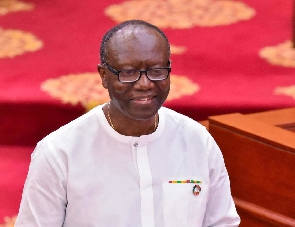 Finance Minister, Ken Ofori-Atta
Finance Minister, Ken Ofori-Atta
The government of Ghana spent GH¢68.4 billion in 2019, representing 19.8% of Gross Domestic Product (GDP).
This is compared with the GH¢59 billion (19.6% of GDP) recorded for the corresponding period in 2018.
According to the January 2020 Monetary Policy Report, the pace of spending was broadly within the projected outturn.
This outturn represents a year-on-year growth of 15.9% and constituted 96.4% of the expected target for the period.
Of the total expenditures, interest payments amounted to GHS19.7 billion (5.7% of GDP) for the review period compared with GH¢15.8 billion (5.3% of GDP) for the same period in 2018.
This outturn was 0.8% above the projected target of GH¢19.5 billion, about 5.7% of GDP.
Compensation of employees for the period amounted to GH¢22.0 billion, representing 6.4% of GDP.
This was below the programmed target by some 1.9% but represented an annual growth of 12.3%.
Of this, wages and salaries amounted to GHS19.5 billion (5.6% of GDP), below the envisaged target by 1.4 percent.
The Use of Goods and Services for the period under review amounted to GHS6.1 billion (1.8% of GDP) compared with the target of GH¢6.9 billion (2% of GDP).
Grants to government units during the period under review also amounted to GH¢11.4 billion, about 3.3% of GDP, against the target of GH¢13 billion, about 3.8% of GDP.
Capital expenditures was GH¢6.1 billion (1.8% of GDP) compared to the target of GH¢6 billion (1.7% of GDP).
This represented a year-on-year increase of 29.8%.
Domestically financed capital expenditure accounted for some 41% of the total with the rest financed from foreign sources.